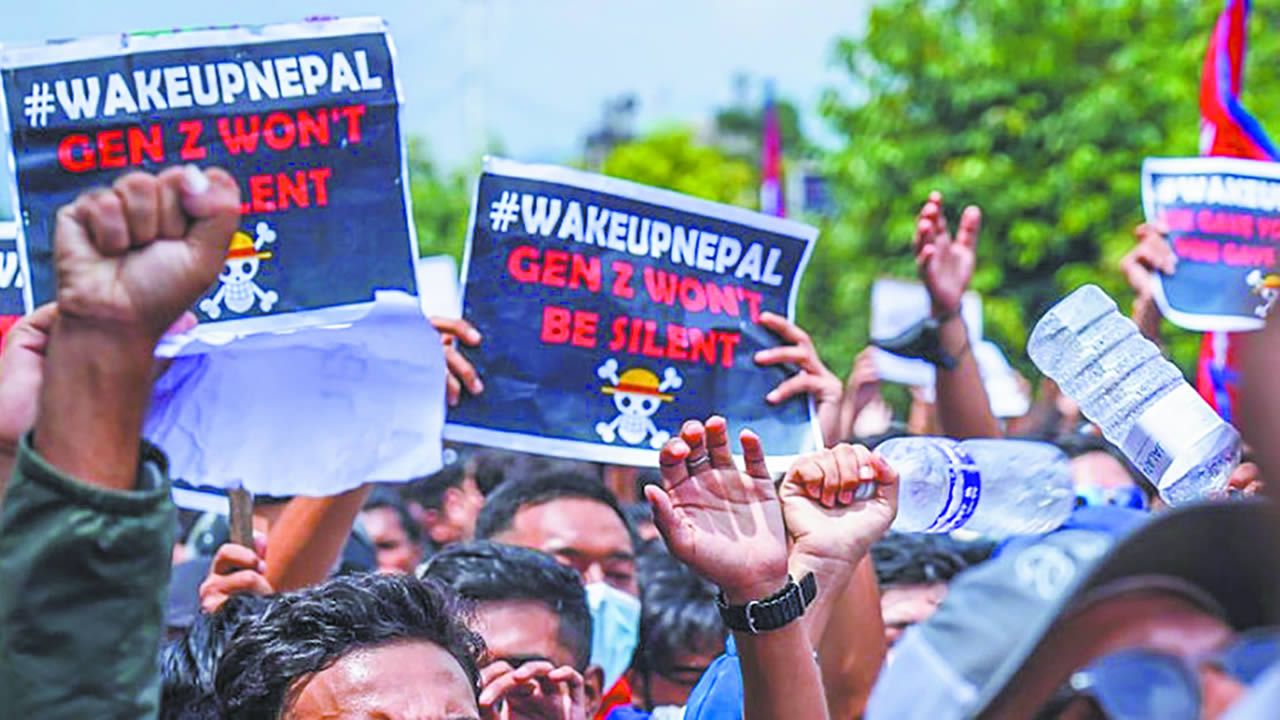
From Sri Lanka’s protests against economic crisis, to Nepal’s mobilization, to Madagascar’s youth-led movements, and now Morocco—Gen Z is taking the frontlines. Being digitally native, globally connected, socially outspoken, and unwilling to accept “business as usual”, Gen Z is making their voice heard worldwide, specially in the Global South. News on Sunday speaks to experts to examine how this global youth awakening is reshaping the Global South and whether Mauritius could be next.
Across the Global South, a new generation is reshaping the political and social landscape. From Colombo to Casablanca, Gen Z is making its presence felt — loud, restless, and determined to be heard.
In Sri Lanka, the young people spearheaded the protests at “GotaGoGama,” a movement born from economic collapse and desperation. In Nepal, youth rose against corruption, chronic unemployment and the lack of economic opportunities. In Madagascar, frustration over governance, the soaring cost of living, and a failing education system has pushed young voices to the forefront. And in Morocco, recent waves of mobilisations see Gen Z demanding answers on unemployment, inequality, and freedoms.
The uprising in Sri Lanka led to the resignation of President Gotabaya Rajapaksa and the upheavals in Nepal led to the resignation of the Prime Minister KP Sharma Oli. Madagascar's president dissolved his government on Monday last in an attempt to placate the protesters there.
This growing pattern raises an urgent question: is Gen Z becoming the defining force of political change across the Global South — and how long before their echo reaches Mauritius?
Sociologist Rajen Suntoo notes that before analysing their impact, it is essential to first understand who Gen Z is. “The Gen Zs are those born between 1995/1996 to 2011/2012. They are the ones found between the millennials and the Generation Alpha groups. Their age group is 13/14 years of age to 29/30 years of age. They are often called as 'Zoomers'. These are dynamic youngsters and children of mostly the Baby Boomers and Generation X cohorts.”
All over the world, he states, these youths are known to be very active and very much attached to the smartphones, social media platforms like TikTok, You Tube, Instagram, Facebook, Telegram, WhatsApp, among others. “They have been socialised through various agents of socialisation, more particularly the media, online peer group and nuclear family. They are concerned with up-to-date lifestyle, dress codes, fashion and do everything they can to be in the lime light.”
Rajen Suntoo further explains that they have their own youth culture although they follow the mainstream culture. “They love transparency, honesty, socio-economic justice, freedom to voice out their opinion and equality and fairness. In a very subtle manner, they follow politics and they are easily convinced to group themselves to fight for their freedom. Their love for freedom makes them unique in the sense that they never tolerate any authority that tries to control them unnecessarily.”
From a sociological point of view, underlines Rajen Suntoo, the Gen Z is for socio-economic stability, peace and harmony in a society so long that their needs are met. “They observe what happens in everyday life through social media and they know what is good for society. Although they are in conflict sometimes with parents and authority, they like that their opinions are taken into consideration. They are for dialogues and effective communication but they must be respected and their opinions need to be taken into account.”
He adds that Gen Zs are extremely kind and cultured but they know they are the silent walking volcanoes.
Sociological Analysis: Gen Z’s role in recent political upheavals
According to the sociologist Rajen Suntoo, the Gen Z loves socio-economic justice and transparency in governance from authority. “They see what is happening all over the world. They are aware of the capitalist society and the politicians’ lifestyle. Everyone should understand that the Gen Z never tolerates injustice in any field: education, politics, religion, Distribution of resources and positions and status,” he says.
He asserts that what is most important for the Gen Z is for the politicians to rule the country for the benefit of the population and to distribute the wealth of the nation in a fair manner. “The earlier politicians understand this, the better for them. Arab uprising is the lesson which many politicians around the world forgot. Now, we can see what is happening now in Nepal, Madagascar, Morocco and other parts of the world.”
A sense of collective identity
The Sociologist trusts that social media definitely plays a key role in creating a sense of collective identity for youth across borders. “Social media platforms are not only for education and learning, leisure and so on. Gen Z keeps themselves updated and become more creative and innovative in all areas. Thus, the youth know how to get engaged and become one when needs be.” Rajen Suntoo cites the example, the Internet and social media ban in Mauritius last year. “It was just a warning sign and it had its consequences for election results.”
Mauritius has long been seen as politically stable compared to other countries in the region. Does this stability mean Gen Z here is less likely to rise up, or could that change?
Our sociologist avers that politicians should stop having with their selective Alzheimer attitudes “Else, it won’t be late until the Gen Z with the Apha ones, who are still very young but who learn quickly, to take to streets to show of what metals they are made. These are lesson for all politicians and people in authority,” he affirms.
Impactful Gen Z activism
When asked whether Mauritius’ relatively small size and close-knit society could make Gen Z activism more impactful or more constrained, sociologist Rajen Suntoo stressed the importance of honesty and good governance. “The population relies on the leaders and the latter has to perform in the most transparent manner. The new government is in the right path but they need to accelerate and provide sufficient amount of information on what they are doing and how it will be beneficial for the country. The Gen Z should be part and parcel of the authority in all decision making and policies as their lives matter. They need to get the proper guidance to avoid the social ills. No country can be successful if the Gen Z demands and requests are neglected. Gen Z needs to be fully engaged and civic engagement should be catered for by the authority for the youth and for the country as a whole.”
The Psychology of Gen Z Protest:The Psychological Drivers
The psychologist Azeemah Beeharry explains that there are two major psychological drivers behind Gen Z’s willingness to protest and challenge authority. “Gen Z’s drive to protest and challenge authority is rooted in both their stage of development and the world they have grown up in. Many are still shaping their identity, and activism offers a sense of purpose and connection. They are highly attuned to injustice, and constant exposure to global issues through social media makes these problems feel immediate and personal. Digital platforms also give them confidence that collective action matters. Having witnessed repeated failures of institutions, they tend to question authority and demand accountability. For them, protesting is not just self-expression but also a way to influence a fairer future,” she utters.
Azeemah Beeharry explains that Gen Z’s perspective is largely influenced by the uncertainties of their time. “Concerns about climate change create both a drive to act and anxiety about what lies ahead. Economic instability and rising costs leave many unsure about job security, but also encourage flexibility and creative problem-solving. Being raised in a digital world connects them to global networks and social causes, while also exposing them to nonstop comparisons and information overload. As a result, this generation tends to be socially aware, skeptical of traditional systems, and motivated to push for meaningful change that leads to a fairer and more sustainable future.”
Online Activism
The psychologist highlights both the benefits and challenges of online activism for Gen Z. “Social media allows them to connect with others, support causes, and take meaningful action, giving them a sense of purpose and community. This engagement can help them develop resilience and feel more capable when facing difficulties. At the same time, constantly seeing news about climate issues, social injustices, and global crises can lead to anxiety, stress, and feelings of being overwhelmed, often called “doomscrolling.” It is therefore important for one to maintain a balance by staying involved in causes while taking breaks to recharge. This will help to protect their mental health and sustaining long-term engagement.”
Frustrations of the Mauritian Gen Z
Turning to the Mauritian context, she addresses the frustrations faced by Mauritian Gen Z in relation to unemployment and limited opportunities. “Over time, these difficulties can create stress, frustration, and a feeling of being trapped. When financial stability and future planning seem uncertain, it is natural for these emotions to build up, sometimes leading to tension and dissatisfaction. In addition, exposure to global opportunities through social media adds another layer of pressure. Seeing peers succeed abroad or following international trends can make local challenges feel unfair. As Psychologists we note that when what people expectations do not match reality, feelings of anger, helplessness, and disappointment often increase.”
That said, she affirms, frustration does not always lead to public outbursts or protests. “How young people respond depends on several factors. Having support from family, friends, or mentors, learning coping strategies, and having safe ways to express opinions can help turn frustration into positive, constructive action. Without these supports or opportunities to make their voices heard, frustration can grow and sometimes result in collective action, such as demonstrations or activism.
She trusts that Mauritian Gen Z faces real pressures that could lead to social tension. “The difference lies in the environment. Guidance, support, and opportunities for engagement can help young people transform frustration into constructive action, giving them a sense of control, hope, and empowerment for the future.”
Social, cultural, mental and emotional barriers
On the question of what mental or emotional barriers might hold Mauritian Gen Z back from openly confronting authority, psychologist Azeemah Beeharry observes: “Many young Mauritians are aware of social and economic challenges, but several factors can prevent them from speaking out. They may worry about losing jobs or opportunities, doubt their ability to make a difference, feel constrained by cultural expectations, or be too stressed and overwhelmed to take action. Overcoming these obstacles requires support and confidence-building which can be tackle through education about their rights, guidance from mentors, and safe spaces to express their views. With these resources, young people can transform their frustration into constructive action, allowing them to engage with authority and advocate for change in a safe and effective way.”
Political Perspective : Gen Z and the Politics of Change
What risks and opportunities do governments face when dealing with Gen Z mobilizations? According to Dr Avinaash Munohur, Political Scientist it is difficult to talk about opportunities for governments when looking at Gen Z mobilisations. “They are a clear opposition to political regimes that are perceived as corrupt and nepotistic in nature. And the protests all have a clear objective: to overthrow the political status quo. The Gen Z protests echo the Arab Spring of the early 2000s. The accent here is more on the youth – hence the Gen Z name – and the role of social medias is even more important. Like the Arab Spring, there is an element of social mimicry that is creating a sort of ripple effect in very diverse countries. What started in Nepal has now spread to Madagascar, Morocco and some parts of Latin America. Time will tell whether the movement keeps spreading.”
On the question, if the Gen Z activism can translate into long-term political reform, or does it risk burning out, Dr Munohur declares that it is difficult to say at this stage. “We are only talking about uprisings. Whether these uprisings will turn into revolutions remain to be seen. And what sort of system these potential revolutions will bring about also remains to be seen. So far, it is easy to see a common thread, which is at the root of these uprisings. It is a clear reaction against political regimes that are perceived as corrupt and nepotistic, against the establishment if you prefer, which is perceived as a closed circle of families that control the resources, institutions and the economy in a way that doesn’t allow for fair opportunities for others. What these regimes might be replaced with is completely speculative at this stage. Let’s not forget that Nepal, Madagascar and Morocco have very different social organisations, cultures and histories. Again, looking at the Arab Spring - and at Egypt in particular – the overthrow of Hosni Mubarak paved the way for the Islamic Brotherhood to seize power, which in turn was overthrown by the army, allowing for General el-Sisi to seize power,” he states.
On how institutions should engage with Gen Z to prevent recurring upheavals, political scientist Dr. Avinaash Munohur asserts that it is clear that the Gen Z movement wishes to see radical political and social transformations, which very often the older generations of politicians have trouble grasping.
“What I particularly find interesting here is that the Gen Z generation is very often described as being apolitical, as having no interest in political matters. We are clearly seeing that it is not the case. It’s just that they engage differently and their aspirations seem to be in stark contrast to what the political leaders of their countries seem to be able to provide. It actually makes a lot of sense when you think about it. The Gen Z generation is the first generation to be born with the digital revolution. In a sense, they have had access to global ideas from the outset, and these ideas have shaped their vision of the world and hence their aspirations – which are very often radically different from the lived political realities of their respective countries.”
Are Mauritian institutions are doing enough? “Coming to Mauritius, it is clear that the current government was elected on the promise of change – whereas that very notion of change was not once defined precisely during the electoral campaign. Where do we stand almost a year after the 2024 elections in regards to changing the system? Each person will have his or her answer to that question,” he affirms.
Could Mauritian Gen Z take the streets?
On whether a worsening cost of living or deepening inequality could push Mauritian Gen Z to the streets, political scientist Dr. Avinaash Munohur claims that in a sense, they already have done so during the last elections.
“This was a clear signal for major reforms. Mauritians are very weary of uprisings and riots, rightly so. The social balance of our multicultural society forces us to be cautious with demonstrating discontent. It can all quickly turn into communal oppositions too easily, and the huge majority of Mauritians do not want this. This is almost like a sort of safeguard for the peace and stability of the country. But, when the democratic process, which elections are just a small part of, doesn’t work anymore then Mauritians have also demonstrated their ability to rise. Nobody will have forgotten the events of February 1999 for example.”
It is therefore, he stresses, the duty of this government to fully understand the will of the people that was expressed in the last elections and act swiftly upon it. “If they don’t then anything can become possible, especially in a context where there is no real political alternative to the status quo that was formed after independence,” he emphasises.
Turning to whether Gen Z is picking up the legacy of Mauritius’ student and labour protests of the past, Dr. Munohur explains: “There is a major difference between the Gen Z protests and the student and labour protests you are referring to: we no longer live in a world where class struggle and socialism are still relevant modes of action and ideology. What I mean by that is that the left is yet to propose a credible alternative to the established global order, an alternative where the so-called dominated can push for policies that defend their interests. In a sense, we are actually seeing a new form of class struggle emerge through social medias, which are giving a voice to the voiceless, and which are used to disseminate ideas and connect localized struggles. All the ingredients for a global movement are present, whether it will happen or not is yet to be determined.”
Should policymakers here take the lessons of Sri Lanka, Nepal, or Morocco as a warning sign? “My feeling is that policy makers should always consider any form of social and economic discontent and frustration as the potential for uprisings. But if history does serve to show, it’s very much that policymakers are very often left in the dark as to the mood of the people. They very often underplay it if it doesn’t suit their views, and they often also simply to not see the discontent. Such is the nature of political power, the deciders are usually incredibly isolated in their ivory towers, which creates the sort of disconnect that can grow until it explodes,” concludes Dr Munohur.

Notre service WhatsApp. Vous êtes témoins d`un événement d`actualité ou d`une scène insolite? Envoyez-nous vos photos ou vidéos sur le 5 259 82 00 !

















![[Info Soirée] : « UN ENFANT DE 3 ANS OUBLIÉ AU JARDIN BOTANIQUE »](https://files.defimedia.info/sites/default/files/styles/square_thumbnail/public/thumbnail-171225_0.jpg?itok=7aMrnLPt)



